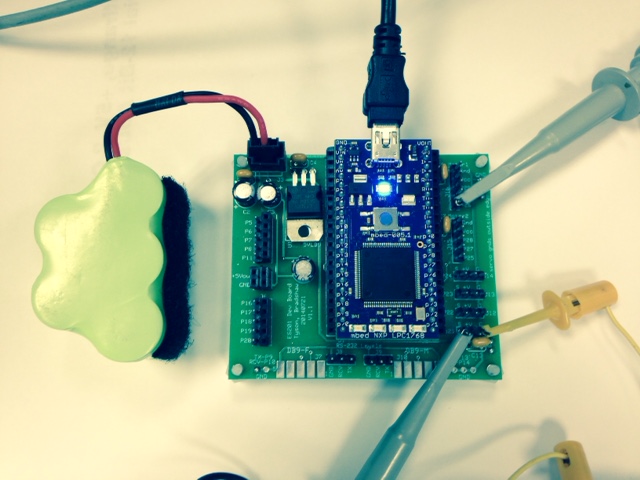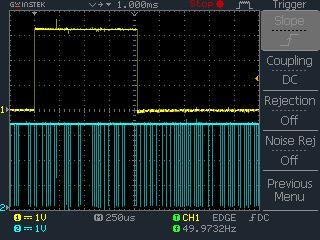Test program for the ES200 board
ES20X mbed board I/O Tester
This program allows you to quickly test the digital output port pins (p5, p6, p7, p8, p11), the analog input pins (p16 - p20), RS-232 Serial ports (p9,p10) and (p13, p14), four hobby servo control ports using the SERVOGEN library for pins (p21, p22, p23, p24) and exercising the 2 motor control ports (p25, p27 and p27) for port 1 and (p26, p30, p29) for port 2.

O'scope lead attachment

Screen capture of O'scope. The blue trace is the PWM on the motor control port, the low 20us PWM period cannot be captured on this digital scope with the hobby servo signal.
include the mbed library, and SERVOGEN.h with this snippet
// J. Bradshaw 20141119
// Program for testing I/O on mbed ES200 breakout board
#include "mbed.h"
#include "SERVOGEN.h" //uses SERVOGEN.h library for generating servo pulses
DigitalOut myled(LED1);
//PC serial connection
Serial pc(USBTX, USBRX); //tx, rx via USB connection
Serial DB9_female(p9, p10); //DB9 serial female
Serial DB9_male(p13, p14); //DB9 serial male
//Port J2
BusOut bus_J2(p5, p6, p7, p8, p11);
//header for J2
DigitalOut J2_p5(p5);
DigitalOut J2_p6(p6);
DigitalOut J2_p7(p7);
DigitalOut J2_p8(p8);
DigitalOut J2_p11(p11);
//Analog port in J3
AnalogIn J3_P16(p16);
AnalogIn J3_P17(p17);
AnalogIn J3_P18(p18);
AnalogIn J3_P19(p19);
AnalogIn J3_P20(p20);
// servo ports p21 - p24
SERVOGEN sv1(p21);
SERVOGEN sv2(p22);
SERVOGEN sv3(p23);
SERVOGEN sv4(p24);
DigitalOut mot1_ph1(p28);
DigitalOut mot1_ph2(p27);
PwmOut mot_en1(p25);
DigitalOut mot2_ph1(p29);
DigitalOut mot2_ph2(p30);
PwmOut mot_en2(p26);
//Motor control routine for PWM on 5 pin motor driver header
// drv_num is 1 or 2 (defaults to 1, anything but 2)
// dc is signed duty cycle (+/-1.0)
void mot_control(int drv_num, float dc){
if(dc>1.0)
dc=1.0;
if(dc<-1.0)
dc=-1.0;
if(drv_num != 2){
if(dc > 0.0){
mot1_ph2 = 0;
mot1_ph1 = 1;
mot_en1 = dc;
}
else if(dc < -0.0){
mot1_ph1 = 0;
mot1_ph2 = 1;
mot_en1 = abs(dc);
}
else{
mot1_ph1 = 0;
mot1_ph2 = 0;
mot_en1 = 0.0;
}
}
else{
if(dc > 0.0){
mot2_ph2 = 0;
mot2_ph1 = 1;
mot_en2 = dc;
}
else if(dc < -0.0){
mot2_ph1 = 0;
mot2_ph2 = 1;
mot_en2 = abs(dc);
}
else{
mot2_ph1 = 0;
mot2_ph2 = 0;
mot_en2 = 0.0;
}
}
}
//------------ Main ------------------------------
int main() {
float analogVal[6];
pc.baud(9600);
DB9_female.baud(9600);
DB9_male.baud(9600);
mot_en1.period_us(20);
mot_en2.period_us(20);
while(1) {
bus_J2 = 0x1f;
analogVal[0] = J3_P16;
analogVal[1] = J3_P17;
analogVal[2] = J3_P18;
analogVal[3] = J3_P19;
analogVal[4] = J3_P20;
pc.printf("%.2f %.2f %.2f %.2f %.2f \r\n", analogVal[0],analogVal[1],analogVal[2],analogVal[3],analogVal[4]);
DB9_female.printf("Female %.2f %.2f %.2f %.2f %.2f \r\n", analogVal[0],analogVal[1],analogVal[2],analogVal[3],analogVal[4]);
DB9_male.printf("Male %.2f %.2f %.2f %.2f %.2f \r\n", analogVal[0],analogVal[1],analogVal[2],analogVal[3],analogVal[4]);
//toggle bus I/O for testing
wait(.5);
bus_J2 = 0xAA;
wait(.1);
bus_J2 = 0x55;
wait(.1);
bus_J2 = 0xAA;
wait(.1);
bus_J2 = 0x55;
wait(.1);
bus_J2 = 0; //all off
wait(.5);
pc.printf("\r\n");
// Run PWM and servo command signals
for(float pos=0.0;pos<1.0;pos+=.034){
sv1 = pos * 1000 + 1000;
sv2 = pos * 1000 + 1000;
sv3 = pos * 1000 + 1000;
sv4 = pos * 1000 + 1000;
mot_control(1, (pos*2.0) - 1.0);
mot_control(2, (pos*2.0) - 1.0);
pc.printf("pos = %.2f \r", pos);
wait(.06);
}
for(float pos=1.0;pos>0.0;pos-=.034){
sv1 = pos * 1000 + 1000;
sv2 = pos * 1000 + 1000;
sv3 = pos * 1000 + 1000;
sv4 = pos * 1000 + 1000;
mot_control(1, (pos*2.0) - 1.0);
mot_control(2, (pos*2.0) - 1.0);
pc.printf("pos = %.2f \r", pos);
wait(.06);
}
}
}
History
Test program for the ES200 board I/O
2014-11-19, by jebradshaw [Wed, 19 Nov 2014 15:26:45 +0000] rev 0
Test program for the ES200 board I/O